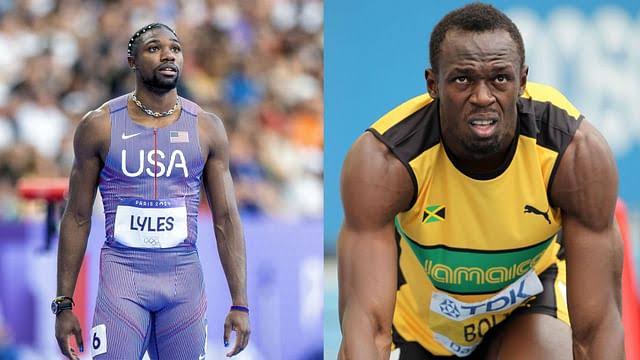
The speed of Noah Lyles’ 100m win at the Paris Olympics has been recalculated as a new rule change could see legend Usain Bolt lose his world record.
Back in May 2008, Olympic legend Bolt made history as he ran 100 metres in a stunning time of 9.72 seconds at the Reebok Grand Prix in New York, setting a new world record.
However, the Jamaican wasn’t done there, as he went on to break his own record another two times, at both at the 2008 Beijing Olympics with a time of 9.69 in the 100m final and the 2009 World Athletics Championships in Berlin, setting the current world record time of 9.58.
Since then, many of the world’s fastest men have failed to dethrone Bolt, including current Olympic champion Lyles, but this could be about to change as World Athletics are considering implementing a massive rule change.
With a personal-best 9.784 second time in Paris, Lyles took home the gold medal at the 2024 Olympics, coming closer than he ever has to beating Bolt’s record despite suffering from COVID-19.
However, had he run as fast as he did this summer under the new ‘super track’ that is being considered by World Athletics, it is almost certain that the American would have smashed the Olympic legend’s long-standing record.
What is a ‘super track’?
As reported by The Telegraph, a laboratory near Cambridge believes that what was once deemed impossible could finally be achieved.
Hong Kong-born sprinter turned entrepreneur, Alvina Chen, who has worked with a British-based team of experts across physics, maths, electrical and mechanical engineering, chemistry and manufacturing, has overseen the world’s first digital ‘smart’ track.
It has been suggested that its sensors can ‘provide a raft of real-time data that would be transformative to athletes, coaches, fans and media, but early testing has pointed to an energy return that is some 20 per cent greater than existing tracks’.
How can the ‘super track’ lead to Usain Bolt’s world record being broken?
Should this ‘super track’ be introduced, it is believed that it would allow for the best athletes in the world to achieve a time that could massively eclipse Bolt’s record.
Chen, who founded Feldspar, explained: “There is the potential for early nine seconds if not sub nine seconds for a human. We see how running shoes have evolved a lot, training methods and nutrition… but one thing that hasn’t changed pretty much is the track surface – that hasn’t changed for like 60 years, from the 1968 Olympics.
“We believe we are creating the first major advancement. With our track, we anticipate that it will be 20 per cent faster than the Paris Olympic track, depending on athlete ability and external conditions. Our vision is to have the track become the universal standard all over the world. We have the world’s fastest running surface.”
While many different factors will no doubt influence the improved times on a super track, if Lyles improved on his Paris 2024 time by 20%, he would achieve an unbelievable time of 7.83 seconds.
Usain Bolt is widely considered to be one of the greatest athletes of all time.
Usain Bolt is widely considered to be one of the greatest athletes of all time.
The report also stated that ‘positive talks’ have been held with World Athletics with regard to ratifying Feldspar’s “super track”.
Head of sprints and relays at British Athletics, Darren Campbell, joined Feldspar last year and believes the ‘super track’ can be beneficial.
He said: “We are going into an era when technology is at the forefront of every sport. When you start trying to immerse people into athletics, you are going to have to educate them and bring them on the journey.
“I’ve always watched Formula 1 but now I can see how it is easier for someone to get into because there is so much data. One of the only sports where I’d go, ‘Where is the technology?’ would be athletics. When did we last have some form of technology that isn’t a shoe? This is the innovation I feel that athletics has been waiting for. All of a sudden nine seconds doesn’t seem crazy.”
Be the first to comment